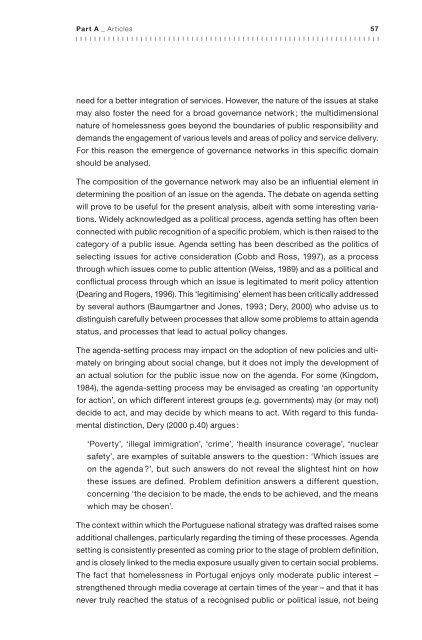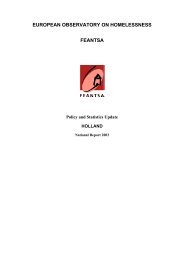Part A - Feantsa - Horus
Part A - Feantsa - Horus
Part A - Feantsa - Horus
Create successful ePaper yourself
Turn your PDF publications into a flip-book with our unique Google optimized e-Paper software.
<strong>Part</strong> A _ Articles<br />
need for a better integration of services. However, the nature of the issues at stake<br />
may also foster the need for a broad governance network ; the multidimensional<br />
nature of homelessness goes beyond the boundaries of public responsibility and<br />
demands the engagement of various levels and areas of policy and service delivery.<br />
For this reason the emergence of governance networks in this specific domain<br />
should be analysed.<br />
The composition of the governance network may also be an influential element in<br />
determining the position of an issue on the agenda. The debate on agenda setting<br />
will prove to be useful for the present analysis, albeit with some interesting variations.<br />
Widely acknowledged as a political process, agenda setting has often been<br />
connected with public recognition of a specific problem, which is then raised to the<br />
category of a public issue. Agenda setting has been described as the politics of<br />
selecting issues for active consideration (Cobb and Ross, 1997), as a process<br />
through which issues come to public attention (Weiss, 1989) and as a political and<br />
conflictual process through which an issue is legitimated to merit policy attention<br />
(Dearing and Rogers, 1996). This ‘legitimising’ element has been critically addressed<br />
by several authors (Baumgartner and Jones, 1993 ; Dery, 2000) who advise us to<br />
distinguish carefully between processes that allow some problems to attain agenda<br />
status, and processes that lead to actual policy changes.<br />
The agenda-setting process may impact on the adoption of new policies and ultimately<br />
on bringing about social change, but it does not imply the development of<br />
an actual solution for the public issue now on the agenda. For some (Kingdom,<br />
1984), the agenda-setting process may be envisaged as creating ‘an opportunity<br />
for action’, on which different interest groups (e.g. governments) may (or may not)<br />
decide to act, and may decide by which means to act. With regard to this fundamental<br />
distinction, Dery (2000 p.40) argues :<br />
‘Poverty’, ‘illegal immigration’, ‘crime’, ‘health insurance coverage’, ‘nuclear<br />
safety’, are examples of suitable answers to the question : ‘Which issues are<br />
on the agenda ?’, but such answers do not reveal the slightest hint on how<br />
these issues are defined. Problem definition answers a different question,<br />
concerning ‘the decision to be made, the ends to be achieved, and the means<br />
which may be chosen’.<br />
The context within which the Portuguese national strategy was drafted raises some<br />
additional challenges, particularly regarding the timing of these processes. Agenda<br />
setting is consistently presented as coming prior to the stage of problem definition,<br />
and is closely linked to the media exposure usually given to certain social problems.<br />
The fact that homelessness in Portugal enjoys only moderate public interest –<br />
strengthened through media coverage at certain times of the year – and that it has<br />
never truly reached the status of a recognised public or political issue, not being<br />
57




